Over-Analyze This
The close of Oscar season is near enough (two weeks and three days away) that a post-mortem is coming to mind: with all the new Oscar blogs that sprouted up this year (Red Carpet, The Envelope, USA Today‘s O-Factor, Anne Thompson’s Risky- Biz) Oscar-race riffing has been incessant and every wrinkle picked over to the point of total exhaustion, and there’s nothing more to say at this stage. Or damn little.
Which is why I’m doing a piece about how dry the well is. At least it’s honest and it mirrors the situation back into itself. I’m as much for keeping the ball in the air as the next guy (ad revenues at this time of year are good for me), but I’m turning the ignition key and the engine’s going “whah-hah-hah-hah-hah!”
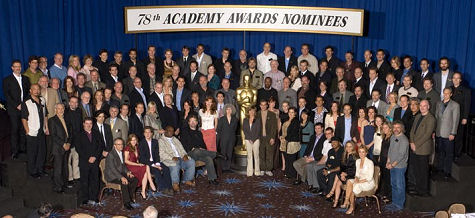
I knew this was true this morning when I got excited over a friend saying that The Constant Gardener‘s Rachel Weisz might not have the Best Supporting Actress Oscar locked after all because he’s been having a premonition that a Marisa Tomei-like surprise could be possible for Capote‘s Catherine Keener or Junebug‘s Amy Adams.
Right after this a line that Keener said in Capote came to mind: “You’re pathetic.” I’m grasping at any straw I can find to keep my energy levels up about this damn thing, and I’m frazzled and frothing and that’s the truth.
I wrote yesterday that the only major-category race in question is whether George Clooney will beat Paul Giamatti for Best Supporting Actor.
< ?php include ('/home/hollyw9/public_html/wired'); ?>
I believe in the Giamatti payback theory — he was fucked over when he wasn’t nominated for Sideways so winning this year will set everything straight.
But I also believe in the compensation argument that says Clooney won’t beat Ang Lee for Best Director and his script for Good Night, and Food Luck (penned with Grant Heslov) can’t beat Paul Haggis and Bobby Moresco’s Crash script, so that only leaves giving Clooney the Best Supporting Actor award for Syriana, which a lot of people admired and would therefore like to support on some level anyway.
Brokeback Mountain has the Best Picture trophy, Ang Lee is locked for Best Director, and it’s solid also for Capote‘s Philip Seymour Hoffman for Best Actor (although it should ideally be a tie between Hoffman and Heath Ledger) and Walk the Line‘s Reese Witherspoon for Best Actress.
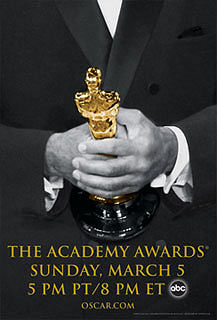
The Giamatti-vs.-Clooney showdown reflects on the Crash and Syriana situations, and Brokeback Mountain‘s Larry McMurtry and Diana Ossana are pretty much assured the Best Adapted Screenplay Oscar, and Gavin Hood’s Tsotsi has the Best Foreign Language Film Oscar in the bag. (The contenders in this category are discussed in a 2.17 Caryn James piece in the N.Y. Times.)
I’m sputtering again. It’s all in a Word item that I put up yesterday at 6:03 pm. I guess there’s always the possibility that some contender might be weakening in some way that I’m not feeling or discerning, but I doubt it. And so would you if you did what I do and you knew your shit.
On the other hand I just looked at Steve Pond’s Envelope piece on the live-action short nominees and this is good informative keep-it-going journalism. I wish I’d written it. I’m suddenly feeling ashamed for sounding so jaded.
Vendetta Dissent
I thought from the get-go that some kind of critical split might happen in response to V for Vendetta (Warner Bros., 3.17). It’s not the kind of movie that produces a fart and a ho-hum. You’re either for it or against it with feeling.
But I was expecting the first attack to come from Michael Medved or some enraged right-wing critic (i.e., someone who might contend that this Larry and Andy Wachowski film romanticizes 9/11-type terrorism), and not from a Variety stringer at the Berlin Film Festival.
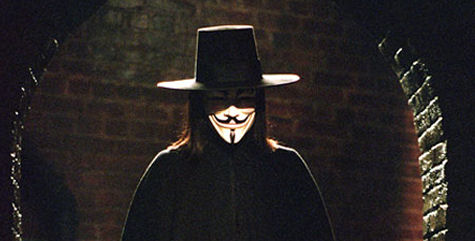
There’s no “right” opinion about any flick, but Leslie Felperin‘s slam of Vendetta, which appeared on Variety‘s website Monday (2.13) and is in today’s print edition, is a bit of “whoa” thing.
She basically calls it turgid and tedious (“flat as a storyboard”) because she’s obviously decided it doesn’t do what good movies are supposed to do, which is grab you by the lapels and turn you around and send you out of the theatre saying, “Man, I just saw something!”
Trust me — V for Vendetta does this, so I’m having trouble figuring Felperin out. I don’t want to suppose anything but critics have bad days like anyone else so maybe she ate some bad sauerkraut.
I was slightly antsy during Vendetta‘s first 15 minutes and maybe in retrospect there should have been a solution to Hugo Weaving having to wear that mask and wig from start to finish, but basically I felt lifted off the ground by Vendetta. Not just for the cinematic punch, but the audacious political blood in its veins.
I may be in the minority, but so far I’m not alone. Movie City News‘s David Poland, the Hollywood Reporter‘s John DeFore, MTV’s Kurt Loder and Ain’t It Cool News Drew McWeeney’s are more or less on the same page.
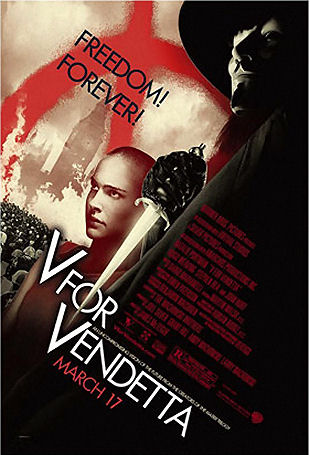
Maybe the next wave of critics (their pieces should start appearing a week or two before the mid-March opening, or about three weeks from now) will be more on Felperin’s side of the aisle…who knows?
What bothers me about Felperin’s piece is that she’s basically gone after the form of Vendetta without dealing with the content of it, and that’s a big avoidance. Is Vendetta a piece of rousing, well-jiggered entertainment? Yeah…but it’s as much of a talking movie as an actioner, and what it’s saying is what it is.
Felperin says Vendetta “suffers from many of same problems as last two install- ments of [the Wachowski’s] Matrix franchise: indigestible dialogue, pacing difficulties and too much pseudo-philosophical info.”
You can debate the pacing issues (I had no problem with the unfolding after the first 15 minutes) but what Felperin seems to be saying deep down is that she finds Vendetta‘s political material either too complex (which seems unlikely since it’s presented in a way that any 12 year-old can understand) or disturbing (which is possible), or she simply doesn’t agree with what’s being said.
“In my book V is one of the most politically audacious mainstream Hollywood films ever made because it really lays it on the line,” I wrote a few weeks ago. “There are dark echoes of 9.11 and 21st Century neocon power dreams and hard-right fanatacism all through it, and yes…the good guy does blow up a building or two.


“And yet — trust me — this is a film that says and stands for all the right things. Which is why it’s going to get attacked.
“Look at all the inflammables…a terrorist hero, a sub-plot about a deeply-in-love lesbian couple (this plus those hot lezzie scenes in Bound tells you the boys definitely have a thing for girl-on-girl action), plus a huge fertilizer bomb under Parliament and that ’03 sex-change operation…forget it, the right’s going to have a field day.
“The bottom line is that V isn’t some simple-minded action flick trying to glorify the struggle of a lone terrorist against a repressive right-wing regime. It’s using a story that follows the contours of an action-thriller to push an allegory about some very real and threatening tendencies in our society today.”
Scent of Toast
I haven’t done any serious calling around about embattled Paramount Pictures president Gail Berman, but I received a letter this morning [Sunday, 2.12] from a woman who seems very knowledgable and connected to people in the creative community, and what she says about Berman and her situation (as well as the perceptions and management skills of Paramount chairman Brad Grey) is fairly damning.
The letter-writer feels that two big stories about Berman so far — Laura Holson’s piece in the N.Y. Times (which was mainly about Grey but touched on Berman) and Anne Thompson’s recent “Risky Business” column — have missed what’s really happening.
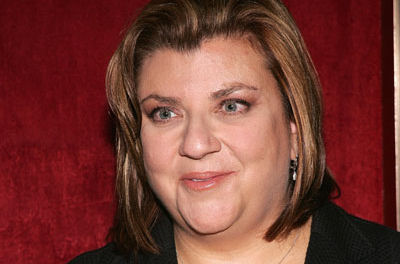
Paramount president Gail Berman.
I’ve spoken to the letter-writer and I’m convinced that she’s right in the thick of things and knows whereof she speaks. She has motives for saying what she’s saying, obviously, but who doesn’t? You can half-tell she’s credible by the insider-sounding information and her down-to-it prose style, but I wanted to make sure of this and now I’m 98% certain she’s legit.
The letter-writer feels that Thompson’s “flattering portrait of Gail Berman is quite one sided…towards Gail.
“The problem with Gail Berman is that not that she is overwhelmingly honest or intelligent or forthright, which are admirable qualities when used well. The problem is two fold — she is all these things but she doesn’t like movies. I repeat: film is not a language she speaks. And she is brusque and insensitive and not on the same page with people who do.
“Ask her what her favorite films are. She can’t tell you. Ask Stacey Snyder or Nina Jacobson or any of the other women who are running studios the same question, and they will talk for an hour about the first time they saw a film. They thrive on that connection made in the dark to a story on a big screen. That is not the case with Gail.
“I doubt she has ever seen a film she has ever loved. Or could let herself love. It is not in her DNA. She has no idea what a good script is. She doesn’t even like to read them.
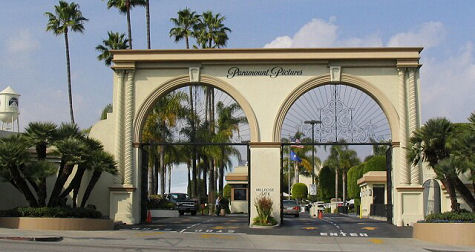
“The other problem is that which Thompson refers to as ‘honesty.’ I refer to it as insensitivity, rudeness, and an unexamined loathing that lurks just under the surface when she deals with artists.
“Instead of learning the medium and the people she is to work with she comes in with zero experience and proceeds to rip projects apart that have been in development for years with no sensitivity to all involved. No sense that she may want to work with these people again.
“Brutish honesty and insensitivity are not the issues. If combined with good taste and a deep knowledge of film and the film business it means you are Scott Rudin. Berman being a woman is the least of her problems.
“The artists of Hollywood are not fools. They know when they are being treated horribly. Her cruelty to artists, her disrespect and ignorance of their body of work, her padding of her own resume…her need to use her power in unrelenting ways and then if you dislike her mask it behind ‘directors and agents are sexist’…that is the problem.
“Paramount was not in a horrible mess in terms of development when Gail arrived. Gail killed every project on the shelf because her ego didn’t allow for Donald Deline’s work to go forward and because she doesn’t have a feel for what is good and what isn’t.
[I was asked to delete three or four examples of Berman having killed some prrojects or pissed this or that person off, which I did.]
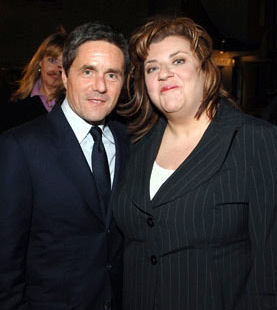
Paramount chairman Brad Grey, studio president Gail Berman
“As for Nacho Libre, Gail tried not to make that film left over from Deline’s development slate. She wanted to ‘redevelop it,’ which is what Gail is famous for. Only when Jack Black marched into her office and demanded she make up her mind — either make it or let it go in turn around — did she reluctantly agree to make it. Now she says in Variety, “I just want to make more films like Nacho Libre.” They were in hysterics down on the set in Mexico [when they heard] that.
“Ridley Scott almost imploded on the lot after a meeting with Gail. The stories are true and endless and yet [Thompson’s] article maintains it has to do with her honest and being a woman.
“As a woman who is honest in this industry I resent the implications. I have no problems working with either writers, agents, directors, executives and producers I encounter. I just know what I am talking about and treat others and their work with respect. I do my homework and I love movies.
“Gail needs some self examination before she starts trotting out ‘I’m a powerful woman and that is why people don’t like me.’ People have never liked her. They have had to endure and succeed in spite of her. She is also a deep grudge holder which has nothing to do with being a woman and is why Jeffrey Katzenberg doesn’t want to be in business with her.
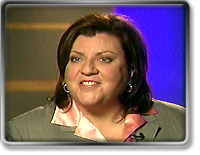
“The underlying issue is why would [chairman and chief executive of Paramount Pictures] Brad Grey hire her at all.
“Here is one theory from someone who has worked with Brad for over a decade. If Gail succeeds, Brad looks like a visionary. If she fails it won’t reflect badly on him because she was so ignorant and inexperienced in movies to begin with. He took a chance and she let him down.
“The truth is Gail was so loathed at Fox she had become ineffective. She needed to move. Brad is in way over his head and didn’t know how to look for the right person and wanted someone quickly.
“After starting the Paramount job Gail went to the agents at the Big Five agencies with Brad Westin and Ali Shermur and held court. She brought out charts like they were at the Network Upfronts explaining where their clients projects stood. Graphs and charts, graphs and charts.
“The agents were horrified at the way she spoke to them and the way she spoke about their clients. Brad and Ali tellingly never said a word. Either it was because Gail wouldn’t let them or they were too embarassed. Again this behavior is going to engender hostility because it is so impersonal and condescending. It has nothing to do with being a woman. Or being honest. It has to do with being a jerk.
“If I was Gail I would get some good therapy. And take a class at AFI. And maybe subscribe to Netflix.”

This is a juvenile and cheap-ass thing to say in a caption, but doesn’t Grey look like a puppet next to his boss, chairman and chief executive officer of MTV Networks Tom Freston? Grey is so much smaller with such a smaller head, I mean.
The writer said the following when we spoke this morning. Here are portions of what she said:
“[Holson and Thompson] are not doing their job because all we’re reading so far is puff piece after puff piece, but what I’m hearing is a consistent stream of frustration.
“No one wants to dislike anyone who’s the head of production at a studio. You want to love them and for them to be your best friend. But everyone has met with this wall of nothingness and hostility, and she doesn’t have the guts to let things go or leave them alone. She has that need to put her stamp on things.
“When you have a competent executive [in the job], they know what to leave alone. And Berman doesn’t seem to understand that when a movie gets made that’s left over from anotehr regime, Berman gets the credit for it.
“She was a big credit hog at Fox. She’s come a long way so far because she’s strong and presents herself so beautiuflly, but she can’t build an individual relationship and understand what an artist does, and it’s really unfortunate.
“The creative community isn’t upset because she’s a woman or because she’s from TV. She doesn’t have movies in her bones. Scott Rudin is blunt and can be impossible, but he loves movies and he understands what artists are about. Gail is missing that piece in her DNA that would make this all really easy for her.
“Instead of firing her, people should help her do her job better, to admit she made a mistake.”
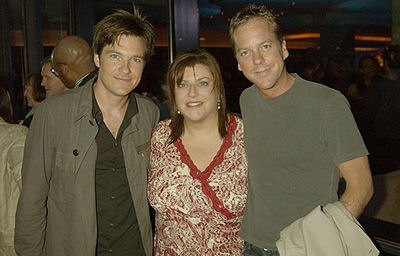
Berman with 24 star Keifer Sutherland (far right) when she was based at 20th Century Fox television.
I broke in during our chat and said that the Berman situation is mainly due to Grey’s not being all that perceptive. It makes it appear as if he didn’t give the matter of hiring her for the top Paramount job very much thought, and in fact makes him look like a thoughtless studio chief.
“Mike Ovitz was Grey’s mentor,” the letter-writer said, “and he doesn’t reveal who he is or where he’s coming from. It’s incredible that they handed him the job [that he has]. He doesn’t go out on a limb for anybody. Hiring Berman was easy for him. If it works out he’ll look like a visionary genius, but if she takes a fall it’s easy for him too.
“Relationships are everything in this town, and Berman doesn’t care about relationships. She only wants to discover people. She doesn’t want to deal with people who are already there. [When she’s in the room] it’s all about shutting down the conversation. I know a lot of people who are feeling crushed by her…and I’ve heard it across the board since she got the job. A lot of people have just given up on her.
“You can be an asshole in this town and do well if you have really good taste and you love movies and your instincts are really good. If you make the grade on these terms people will love you anyway. This business is about pushing rocks up hills, and when you have someone who doesn’t push rocks, who stops rocks….that’s a problem.
“Everyone has a learning curve. The Weinsteins are in a new learning curve, and Gail is in a community and she needs to take her place in it, and it’s a humbling process, but that sense of humility is missing at Paramount right now.”
Show & Tell
Saturday’s Santa Barbara Film Festival panel discussions — one featuring writers and the other producers — were intriguing and stirring with a fair supply of zingers. Tectonic plates didn’t exactly shift under our feet and nobody poured a pitcher of ice water over anyone else’s head, but some interesting truths came through.
The funniest panelist was 40 Year-Old Virgin director-writer Judd Apatow, with Good Night, and Good Luck writer-producer Grant Heslov a close second. The most heartfelt and straight-shootin’-est testimony came from Brokeback Mountain cowriter-producer Diana Ossana. And the wisest and most perceptive comments came from Crash co-wroter Bobby Moresco.
These three all scored during the writer’s panel, which was sagely moderated by Hollywood Reporter columnist Anne Thompson.
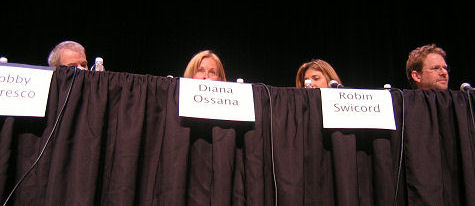
Portions of Crash co-writer Bobby Moresco, Brokeback Mountain co-writer Diana Ossana, Memoirs of a Geisha screenwriter Robin Swicord, and History of Violence writer Josh Olson — Saturday, 2.11.06, 11:35 am at the Marjorie Luke theatre.
I can’t honestly say that the riffs and confessions in the producers panel, hosted by Patrick Goldstein, the industry columnist for the L.A. Times, were quite as memorable, but that’s because the thing that really stood out during this session (and it’s strange to admit this but some observations just stick in your brain and others don’t) was a technical problem involving the sound.
I was sitting in the front row at the Victoria Theatre as Goldstein started the session, and right from the start you could hear rock music coming faintly out of a speaker on stage right…not loud enough to make it difficult to hear the panelists, but just loud enough to be irritating, like a mosquito that won’t stop flying into your ear. Goldstein and the panelists seemed oblivious, but I was saying to myself, “What the…?”
I went out to the lobby and asked what was going on, and they said, “We’re work- ing on it.” So I went back in and waited and waited, and then somebody from the audience finally said, “Will somebody please turn that music off?” and suddenly the dam burst — people had been suppressing their frustration for about 15 minutes — and revolt was in the air. “Unplug the speaker, please!”…”C’mon!”…”this is very irritating”…”we can’t hear you!”
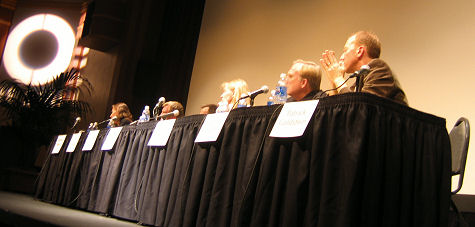
L.A. Times columnist Patrick Goldstein (far right) and producer panelists (Walk the Line‘s James Keach and Brokeback Mountain‘s Diana Ossana are to his immediate right) during the people’s uprising over the sound problem that slightly marred the discussion at Santa Barbara’s Victoria theatre — Saturday, 2.11.06, 2:25 pm.
Suddenly a “whoa” look came across Goldstein’s face. A situation! Everything would have been fine if Goldstein had just unplugged the offending speaker, but for some reason he didn’t want to so finally a young tech guy came up on stage and just shut everything off, and the session continued without microphones.
I could hear much of the what was said after this (Diana Ossana, who had just finished the writers’ panel an hour earlier, kept forgetting to project from the diaphragm) but I had to cup my ears from time to time.
The only real producers’ zinger came when The Chronicles of Narnia producer Mark Johnson chided Goldstein “and your friend John Horn” (i.e., the formidable Los Angeles Times industry reporter) for passing along what Johnson felt were inflated reports of Narnia‘s budget.
Why don’t we forget the producers and go back to the writers? Better material, functioning equipment.
Apatow said The 40 Year-Old Virgin worked “because I knew the terrain of being a 40 year-old virgin [in my own life] all too well.”
At one point Thompson asked Heslov to tell how he met and bonded with Good Night partner George Clooney, and he replied, “Don’t you think that’s a little personal?”
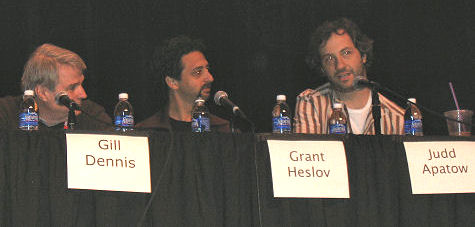
Walk the Line screenwriter Gill Dennis, Good Night and Good Luck writer-producer Grant Heslov, The 40 Year-Odl Viring director-wrter Judd Apatow at Santa Barbara’s Lobero theatre — Saturday, 2.11.06, 11:50 am.
I loved the recollection by Josh Olson, screenwriter-adapter of A History of Violence, about his first time seeing the David Cronenberg-directed film with an audience at the Lumiere theatre in Cannes, and how it went over like gangbusters with everyone cheering at the closing credits.
Ossana talked about the feelings of enormous relief and satisfaction that she and partner Larry McMurtry have gotten from the widespread acceptance of Brokeback Mountain since it opened in early December. “We had hoped before it opened that we might get into 400 theatres,” Ossana said, “but right now it’s playing in about 2000 theatres.”
Ossana said because of the Brokeback heat a script she and McMurtry wrote a long time called Pretty Boy Floyd was “back from the dead” or something along those lines.
Apatow facetiously said he saw parallels between The 40 year-old Virgin and Memoirs of a Geisha. With a bit more sincerity he also explained the story, character and thematic parallels between Virgin and Brokeback Mountain. The second analogy sounded reasonable, but don’t expect me to repeat it….too much work.
Apatow’s next film, he said, “is about a guy who gets a woman pregnant on the first date,” and will therefore “be a little more grounded” than The 40 Year-Old Virgin. “It’s a tragedy,” commented Geisha screenwriter Robin Swicord.
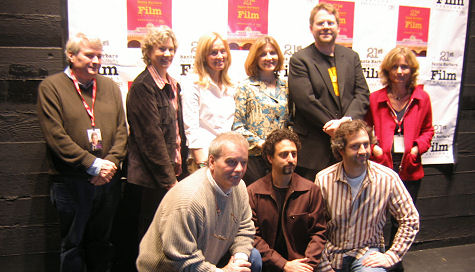
(l. to r., top row) Backstage at the Marjorie Luke: Walk the Line‘s Gill Dennis, writers’ panel moderator Anne Thompson, Brokeback Mountain co-writer Diana Ossana, Memoirs of a Geisha screenwriter Robin Swicord, A History of Violence screenwriter Josh Olson, and a talented and well-respected Italian screenwriter whose name temporarily escapes me (and I don’t mean this as a slight); (l. to. r., bottom row) Crash co-writer Bobby Moresco, Good Night, and Good Luck‘s Grant Heslov, The 40 Year-Old Virgin‘s Judd Apatow.
There was one other bizarre occurence on top of the sound problem at the Victoria, and that was getting thrown out of the outdoor luncheon for the writers after the Marjorie Luke theatre session.
Festival director Roger Durling has made a gracious habit of inviting me to sit down and schmooze with the talent after these discussions in years past, but a certain SBFF publicist was strongly opposed to this and said, “You’ll have to leave.” It was no biggie so I did, but sheesh.
We live in a damaged and dysfunctional world, and every now and then you’re going to meet someone who’s had it a bit tougher than others, and you’re going to find yourself staring into a look of unfettered rage.
